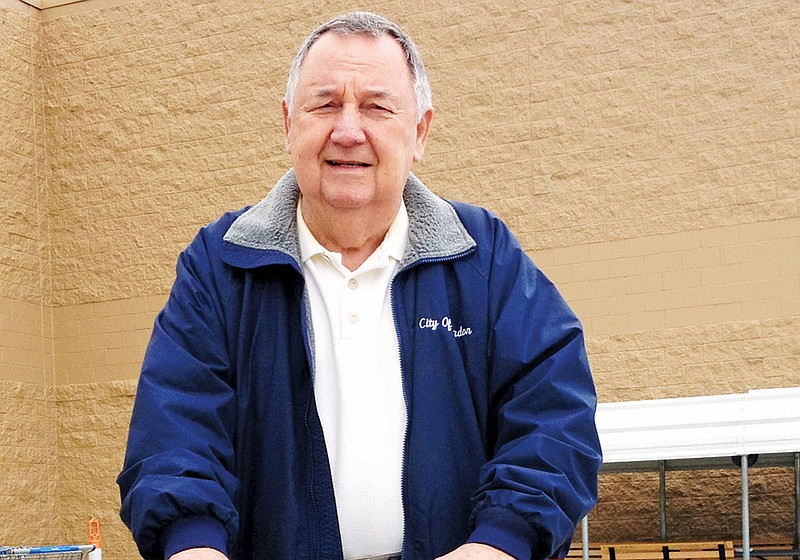GURDON — Mayor Clayton Franklin drives 16 miles from Gurdon to the Walmart Supercenter in Arkadelphia.
He said it is the largest and probably the closest grocery retailer for most of the residents of his town, but he wants Gurdon to have a grocery store of its own, and he said finding a retailer willing to locate in the town of 2,265 will be his top priority this year.
“We have been talking to anybody we can think of about getting a store,” Franklin said.
The mayor said an informal committee has been gathered to find a grocery retailer for the community. Franklin said the group includes members of the Gurdon Chamber of Commerce and the Economic Development Corporation of Clark County.
Gurdon lost its only grocery store about a year ago, he said.
“Rehkoph’s, a group out of Texas, closed their store, the same time they closed the one in Prescott,” Franklin said.
He said the old store, Rehkoph’s Home Town Market, on Main Street might be too big for a grocery business looking to do business in the small town, but the mayor said Family Dollar Stores are interested in moving into half of the building.
“If we can find a prospect, this group of people will help them explore the possibility of using the other half of the store,” Franklin said.
The mayor said anyone who wants to open a store in town will find help available. Franklin said the banks in town “might work with the company to get a new store in town.”
For now, the mayor said, city residents who don’t want to drive to Arkadelphia, or as far south as Hope, turn to the Dollar General Store and some convenience stores that offer milk, bread and some other staples.
“Dollar General is the No. 1 store in the area,” Franklin said. “It is about the only place to go buy anything. They have some processed meats, bread and milk.”
The mayor said Gurdon residents want to buy fresh meats and produce in their own town.
Access to grocery stores for small towns and rural areas has been a concern for the food industry for more than a decade, after many large chains merged and “re-engineered” their operations to increase efficiencies at the turn of the century.
Moving products into stores and out to customers quickly increased profits and kept food fresher for larger chain stores as they challenged Wal-Mart Stores Inc.’s move into the food business in the 1990s, according to information from the Food Marketing Institute , a national organization of 1,250 retail and wholesale food companies operating more than 25,000 grocery stores.
A 2011 report from FMI research found that while there “are more than 36,000 grocery stores in the United States, in some rural areas of the country convenient access to a local grocery store carrying a wide variety of fresh foods, such as milk, eggs, meat or poultry, bread, fruits and vegetables at a reasonable cost is not available.”
FMI researchers went on to say that the absence of supermarkets in some communities could affect the health, economy and social well-being of people living in the community.
“There are economic costs to neighborhoods that lack grocery stores as well. Foods available through corner markets are usually more expensive, and travel costs in both time and money to distant grocery stores can be higher. Also, neighborhoods without grocery stores have fewer local job opportunities. The average supermarket hires 90 people or more directly from the areas where they operate,” the report states.
As Franklin has found, the FMI researchers confirmed that “typically, grocery chains look for areas capable of supporting their store format, rather than developing store concepts to fit a particular area,” according to “Access to Healthier Food: Opportunities and Challenges of Food Retailers in Undeserved Areas.”
The report gave an example that matched the problem in Gurdon.
“For example, if a chain typically builds 48,000-square-foot supermarkets designed to serve 20,000 people, it makes little sense to offer that format in a community of 2,000 residents.”
The information in the report did include suggestions on how cities could help bring in and support a grocery store — for example, through the use of incentives.
“Through initiatives — offered on the federal level (New Markets Tax Credit), state level (Fresh Food Financing Initiative) and local levels (Community Development Corporations) — retailers can obtain private loans to help finance projects that would otherwise be too risky.”
FMI has also suggested that local communities can help stores train new employees because “grocery stores typically hire directly from the surrounding areas.”
Franklin said Wal-Mart is looking at small grocery stores.
“They are putting those
into suburban neighborhoods, not in small towns,” he said. However, the FMI has published stories of some companies that have developed stores as small at 8,000 square feet to be placed in communities that are too small for larger formats but are in need of their products.
Franklin said that whatever store can come into Gurdon will find local customers.
Staff writer Wayne Bryan can be reached at (501) 244-4460 or wbryan@arkansasonline.com.
